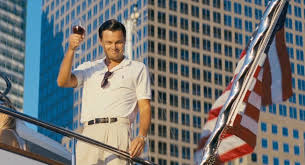Not quite halfway into this (VERY LONG and VERY REPETITIVE) movie, financial con man Jordan Belfort’s (Leonardo DiCaprio) second wife Naomi (Margot Robbie) repeatedly throws cold water into his face.
Hoping this scene would mark a turning point that would launch a counter-narrative to combat the idea that debauchery is fun and bilking the little people is okay because, after all, Wall Street sharks are winners who know how to really spend money with style, I looked down at my watch to mark the moment.
Okay, let me come clean.
I looked at my watch more than once. According to the friend seated beside me, it was more like a half dozen times. All of my time references followed the aforementioned scene because I kept waiting for something new and revealing to happen to salvage the film for me.
It never happened. In the second half of The Wolf of Wall Street, I grew increasingly bored and detached as I realized the turn I hoped for would never come. If there is no character arc for an eponymous character, then other characters or major themes or important plot elements need to provide the larger context that makes the narrative engaging and meaningful.
The film is certainly long enough to cut the repetitive bilking and partying and to enhance the role played by FBI agent Patrick Denham (Kyle Chandler) or, alternatively, to show some of the damage inflicted by Belfort and his cohort rather than continuing to celebrate their excess and his ability to recover from his losses without learning anything or even having to reinvent himself in meaningful ways.
SPOILER ALERT: Most troubling to me is the final shot of Agent Denham taking the train home. Since we know nothing about this character other than what Belfort has suggested in his taunts, viewers are left with the troubling sense that Denham may a bitter schmuck, just as Belfort asserts.
Watching The Wolf of Wall Street, I was reminded of the very different response I had to Martin Scorsese’s 1990 film Goodfellas. Goodfellas seemed remarkable to me then because finally I had seen a film – captivating on multiple levels – that presented gangsters as two-bit, lowlife thugs instead of iconic characters to be glorified.
Henry Hill (Ray Liotta) may have missed his days living the gangster life after he ended up in witness protection, but viewers knew just how tawdry that life had been because of the contrasts drawn between narrator Hill’s perspective and the events depicted on the screen.
The Wolf of Wall Street would benefit greatly from a perspective that contrasts rather than echoes the narrator of Scorsese’s latest biopic.
